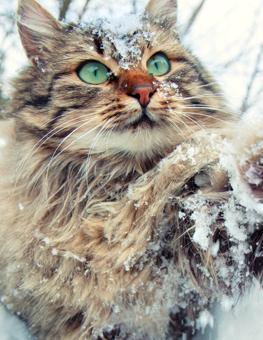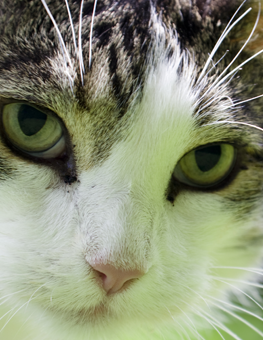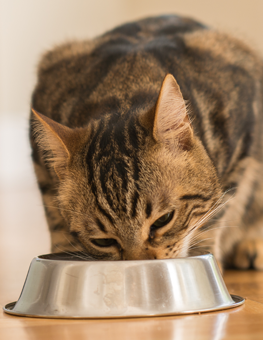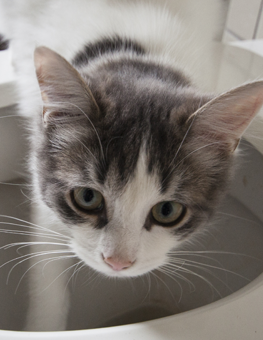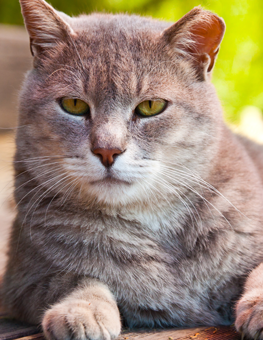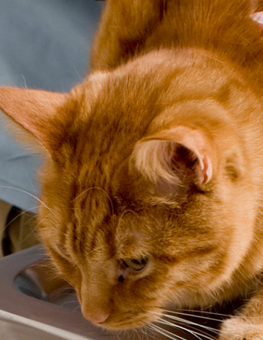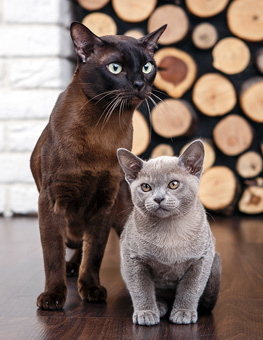Diabetic Symptoms in Cats
Detecting diabetes symptoms in your cat is essential to their health and quality of life
If you've been asking, "Is my cat diabetic?" the answer could be yes. Just like humans, cats can be diabetic. Our feline friends most commonly develop Type II Diabetes, and it is estimated that between 1:100 and 1:500 cats will become diabetic at some point in their lifetime. Knowing the symptoms of a diabetic cat, and what the best diabetic cat treatment is, are both crucial for early diagnosis and effective management. Caring for a diabetic cat can sound complex, but the good news is that this common diagnosis is typically very treatable.
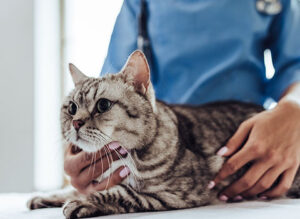
Diabetes is a serious issue for cats. Regular vet visits can help deal prevent and treat diabetes in your pet, leading to longer life and comfort for them.
What are the signs of a diabetic cat?
Diabetes in cats often presents through a range of symptoms. Here are some key signs to watch for:
- Increased Thirst and Urination: Excessive water intake and frequent, large amounts of urine are some of the most common symptoms of diabetes in cats. If your cat has high blood sugar, this can overwhelm her kidneys, causing glucose to spill into the urine. This high urine glucose pulls extra water into the urine, leading to increased urine volume, more water loss, potential dehydration, and increased thirst.
- Increased Appetite: A cat with diabetes may seem hungrier than usual. However, despite their increased food intake, they may not gain weight.
- Weight Loss: Even if your cat still has a good appetite, diabetic cats often lose weight. This is because their bodies can't efficiently use glucose, leading to muscle wasting.
How to treat a diabetic cat
If you are noticing any of the above symptoms and suspect your cat may have diabetes, a vet visit is essential. Only a veterinarian can diagnose a cat as diabetic. Here's how your vet may treat a diabetic cat:
- Insulin Therapy: Many diabetic cats require insulin injections to manage their blood glucose levels. Your vet will guide you on how to administer these shots at home. Typically, these needles are small, painless, and easy to give.
- Oral Medications: In 2023, a new oral medication was approved to treat diabetes in cats. If administering pills sounds easier than giving injections, ask your vet if an oral medication may be an option to manage diabetic symptoms in your cat.
- Regular Monitoring: Keeping a close eye on your cat’s blood glucose level is crucial. This can be done at the vet's office or with a home glucose monitoring kit.
- Diet for a Diabetic Cat: A well-balanced diet is fundamental in managing diabetes. Your vet may recommend a high-protein, low-carbohydrate diet.
What's the best diet for a diabetic cat?
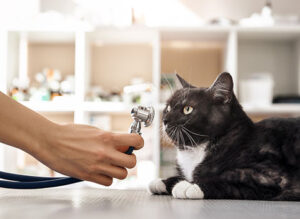
A high protein, low carb diet can help control or even prevent diabetes in your kitty. Talk to your vet about your pet's diet options.
Choosing the right food for a diabetic cat is important for their overall health. Here’s what you should consider when choosing your diabetic cat’s diet:
- High Protein, Low Carbohydrate: Foods that are high in protein and low in carbohydrates can help your cat maintain stable blood sugar levels. Your vet may recommend a prescription diet specifically formulated for diabetic cats.
- Wet Food or Dry Food?: Wet food tends to be a better choice for diabetic cats, as it generally has fewer carbohydrates than dry food.
- Diabetic Cat Treats: Treats for diabetic cats are still an option, but should be chosen carefully. Look for low-carb, high-protein treats and be sure to ask your vet for their recommendations.
Caring for a diabetic cat
Your diabetic cat will need regular vet visits and careful monitoring. Medications and foods may need to be adjusted over time. You’ll need to make sure that you can commit to keeping your cat as healthy as possible by following all of your veterinarian’s directions. Here are a few more tips:
- Consistent Routine: Keep feeding and insulin injection times as consistent as possible in order to avoid blood sugar spikes.
- Monitor for Complications: Be aware of potential complications like urinary tract infections, which are more common in diabetic cats.
- Stay Informed: Keep up-to-date with the latest treatments and dietary recommendations for diabetic cats by visiting your vet regularly and asking questions.
Being able to recognize and properly manage diabetic symptoms in cats is crucial for their well-being and longevity. Proper care, including the right diet and treatments, can help your cat live a healthy, happy life. If you suspect your cat has diabetes, seek veterinary advice promptly. With the right approach, diabetes in cats can be successfully managed.



